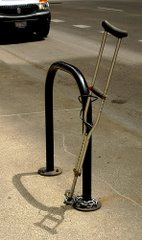I recently saw this
post at Planet of the Blind and wanted to share it with you. I'm always pleased when other people echo the ideas I'm trying to convey. Thanks Stephen!
"...Over time the mere act of talking about the conditions of marginalization becomes a secondary form of abjection... No sensible person would advocate avoiding the use of civil rights language, whether we’re talking about women’s rights or Latina rights or African-American rights, or children’s rights. Yet it seems to me that I am increasingly uncomfortable as a representative of "the disabled community" or "the blind community"—not because I would eschew these political realities, but because the insistence that these are my subjects prevents me from being publicly a more reflective or complex person. I have a sensibility that’s different from what you might suppose... I am not a blind person when I listen to the opera or swim in the Baltic...My feeling is that we must go beyond identification based on race or disability or ethnic origin or gender or sexual orientation for only in so doing can we rebuild a progressive and thoughtful means of public engagement in our nation..."
I couldn't agree more. One thing that I'm particularly interested in is the way we might accomplish this. How do we advocate for disability rights while at the same time not being a person whose sole persona is "Mr./Mrs. Disability"? How do we change something without talking about it?
The only answer I have is to initiate change by example, or as Ghandi said, "Be the change you want to see in the world." One of these days I'll get around to showing you what I mean.

1 comment:
When people discriminate or demonstrate prejudice, that's what forces us to identify with disability or gender or race more. I can forget disability more easily--I'm just me--when I don't have to struggle with access issues and when people aren't being mean.
Glad to see an abled person aware and on our side.
Post a Comment